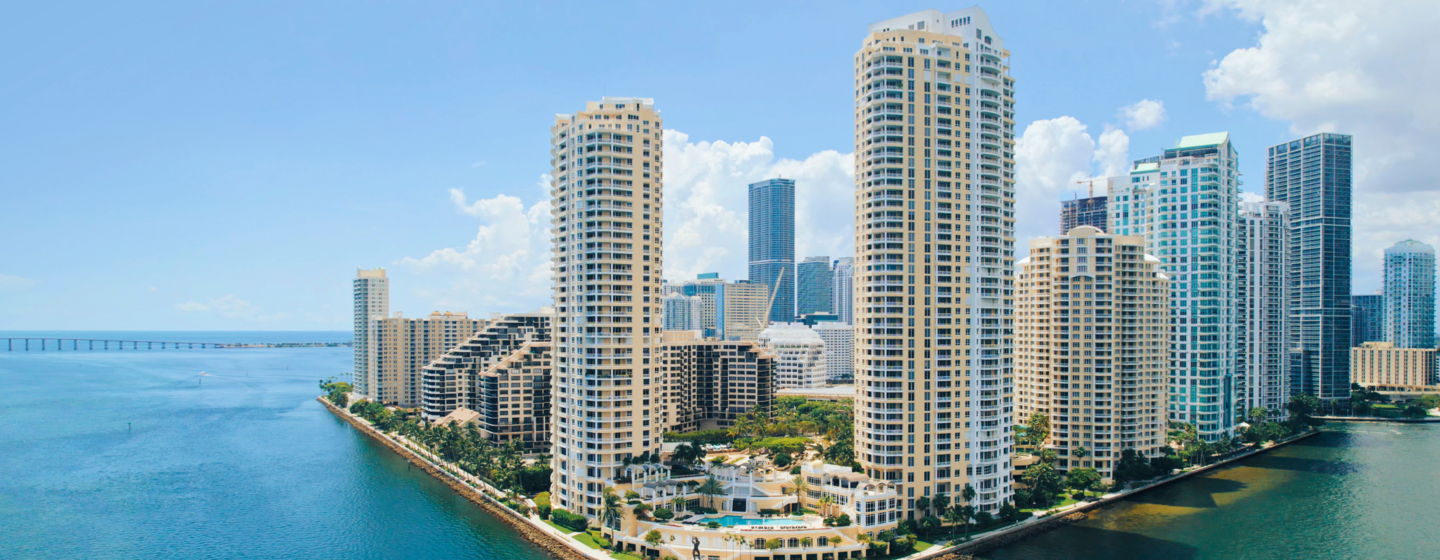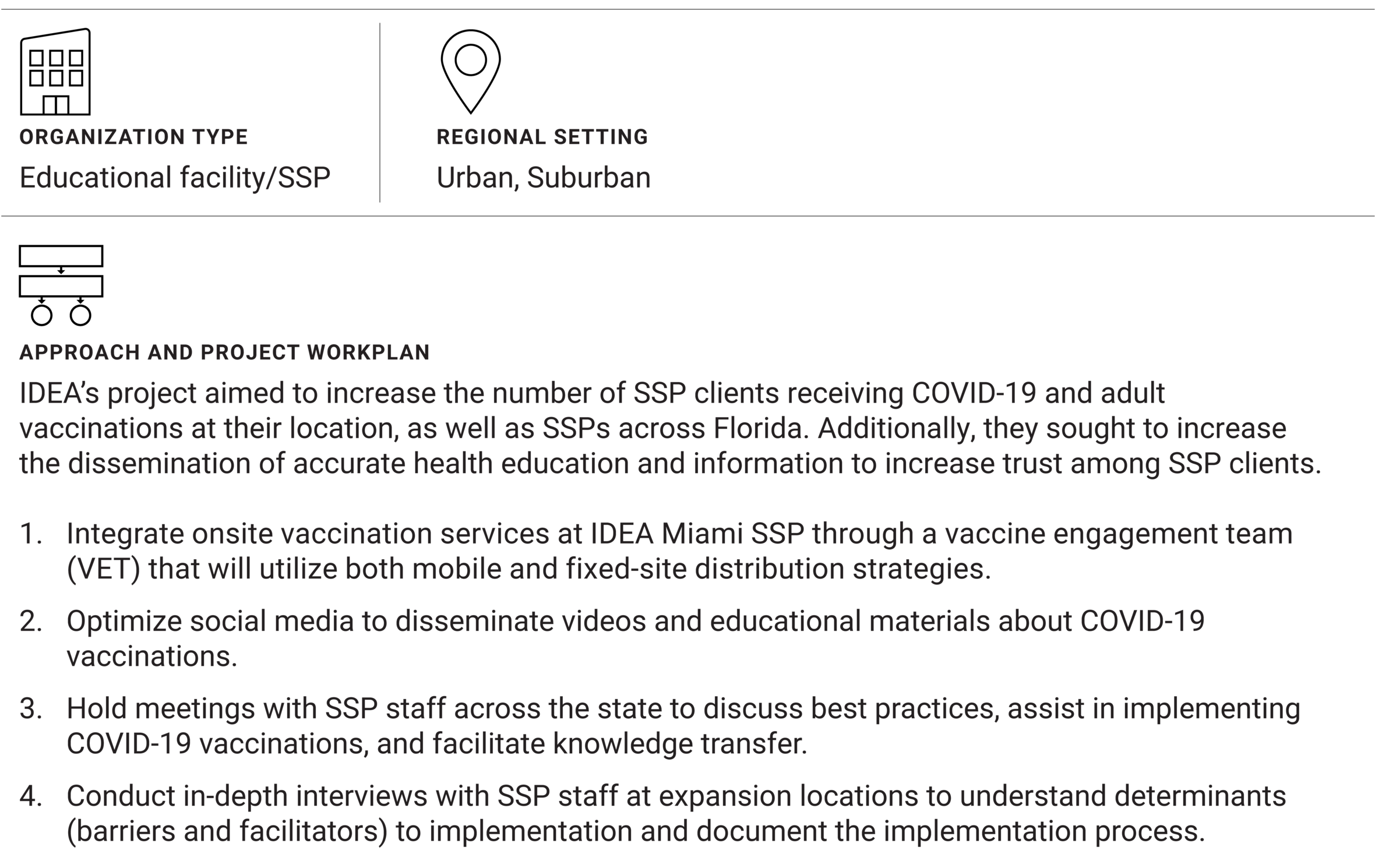
Miami IDEA Exchange
Overview
IDEA Exchange Miami SSP is located in Miami, FL and prioritizes treating its clients in an environment of dignity and respect, working to develop strong, positive relationships with the people it serves. From research to direct service, IDEA Miami has focused on the meaningful involvement of people who inject and use drugs (PWID/PWUD) in the development, testing, and implementation of new health service delivery models at the SSP.
Creative Approaches
Vaccine implementation
IDEA worked to identify the most effective methods of incentivizing participants to seek vaccines and addressing vaccine misinformation through qualitative interviews with participants and program staff.
Flexible facilities
To address broadening participant needs and accommodate program expansion, IDEA has utilized modified/finished containers. This strategy reduces building costs and supplies needed while allowing for modular expansion as the program grows.
Medication Lockers
Many of IDEA’s participants experience houselessness or unstable housing, presenting challenges for those who take regular medication. As participants often access IDEA regularly for harm reduction supplies as well as some medical services, the program offers medication lockers to store medications such as HCV treatment, HIV medications, and more.
Collective Support: IDEA Miami began demonstrating its status as a center of excellence before grant awards were announced. Through a collaboration with the Florida Harm Reduction Collective, a pioneering collective dedicated to promoting harm reduction principles and practices throughout the state, IDEA supported smaller Florida programs in compiling grant applications for this NOFO. Identifying many aspects of the application process that are challenging for smaller SSPS, such as data collection and analysis, relationship building, and crafting of realistic, workable proposals. Acting in their mission to improve the health and well-being of individuals and communities affected by substance use, IDEA and the Collective have seen that a strong network of harm reduction providers is a necessity to improve community health and responded by building that network. Bolstering access to a range of services, including syringe exchange programs, adult vaccinations, naloxone distribution, HIV and hepatitis C testing, education, and counseling not only in Miami but across Florida. Their commitment to harm reduction extends beyond individual interventions, as they actively engage in advocacy efforts, community outreach, and policy reform to create a more inclusive and supportive environment for those affected by substance use.
Despite the challenges of harm reduction program operationalization in Florida, being a NASTAD grant recipient has greatly enhanced the capacity to support the Florida Harm Reduction Collective to develop capacity around vaccine services, Miami IDEA spearheaded an initiative within the Florida Harm Reduction Collective to replicate the survey about vaccination facilitators and barriers with their partners and used that survey as a launching point to discuss people’s perceptions and experiences around vaccine acceptability and accessibility. They incentivized not only participation in the vaccine survey, but also successful referrals for others who completed the survey, providing a new connection to previously disconnected participants. Miami IDEA has been instrumental in providing TA and guidance to all organizations in the Florida Harm Reduction Collective, many of whom were this demonstration project's grantees.
Florida Harm Reduction Conference: This network support included creating space for programs to meet and discuss challenges to Harm Reduction provision and solutions for future services. The 2nd Annual Florida Harm Reduction Conference was held November 6-8, 2023, in Miami, Florida. Over 240 attendees, including people with lived experience, medical providers, academics, health department staff, funders, and other harm reduction advocates, gathered to share best practices related to syringe services programs (SSPs), funding, and hepatitis C and HIV prevention, testing, treatment, and linkage to care. The conference featured 20 breakout sessions and 5 panels. Sessions highlighted 6 sanctioned SSPs in Florida, FLHRC’s programs and Community Advisory Board, wound care for people who inject drugs, and LGBTQIA+ and BIPOC equity.
IDEA Exchange Miami staff participated heavily on the conference planning committee, attended the conference, and volunteered and presented throughout the event. One presentation by an IDEA Exchange Miami staff member focused on the impact of COVID-19 on Syringe Coverage Among U.S. SSPs. During the conference, IDEA Exchange Miami hosted an open house with tours led by Dr. Hansel Tookes and Dr. Tyler Bartholomew, where attendees engaged staff and explored both fixed and mobile sites. The Director of Statewide Expansion at IDEA Exchange Miami highlighted opt-out HIV and Hepatitis C testing implemented at all SSPs in Florida. FLHRC and IDEA Exchange Miami are collaborating with partners in 37 counties across the state.
Successes
- Completed vaccine and engagement survey for both SSP staff and SSP Clients
- Utilized parent agency resources to strengthen and expand services
- Integrated COVID vaccines, as well as MPOX and other adult vaccines into SSP services
- Built out RedCap (c) data collection toolkit for SSPs
- Created outreach materials, brochures, flyers, and collaborated with FLHRC to reach statewide distribution
Challenges
- Providing Harm Reduction services in a hostile political climate.
- Experienced difficulty in hiring culturally competent and reduction-trained medical staff
- Integrating incentives in a responsible and non-coercive manner
- Communitywide vaccine hesitancy
- Community perception of COVID risk was inversely related to COVID rates and spread
It's not just syringe access at this point…that's just like 5% of what we do...A lot of people's HIV treatment runs through the exchange, their buprenorphine treatment runs through the exchange, hep C treatment, PrEP, all integrated through the exchange. And so those services have the potential to be disrupted in those times of crisis like that. But [with] the biggest crisis COVID, we never shut down. We stopped testing for probably only like five or six weeks, and we had an entire telehealth system already built and ready to be implemented. We were able to actually keep people engaged and the entire time, we didn't have really any disruptions or drop off in our care cascade. COVID is a little different than weather. But we try our best to give as many supplies as we can to clients so that we know that at least they have supplies while we might be shut down.
Total Monthly Data
|
Service |
Number of Encounters |
|
Received education on COVID and COVID vaccination |
947 |
|
Referred to COVID vaccination |
279 |
|
COVID-19 Vaccination (on-site) |
97 |
|
COVID-19 Vaccination (off-site) |
N/A |
| Monkeypox vaccinations | N/A |
| Other vaccinations | 29 |
| Total encounters | 3712 |
